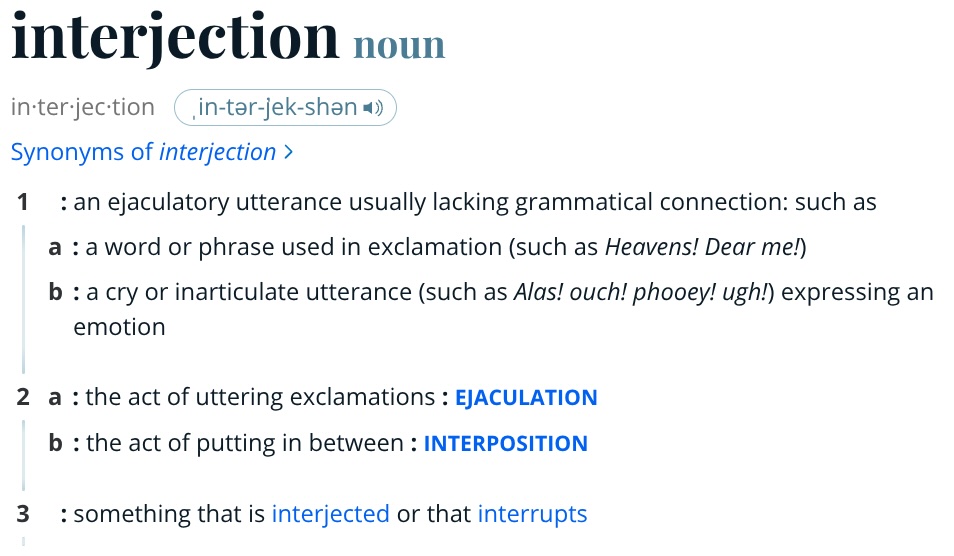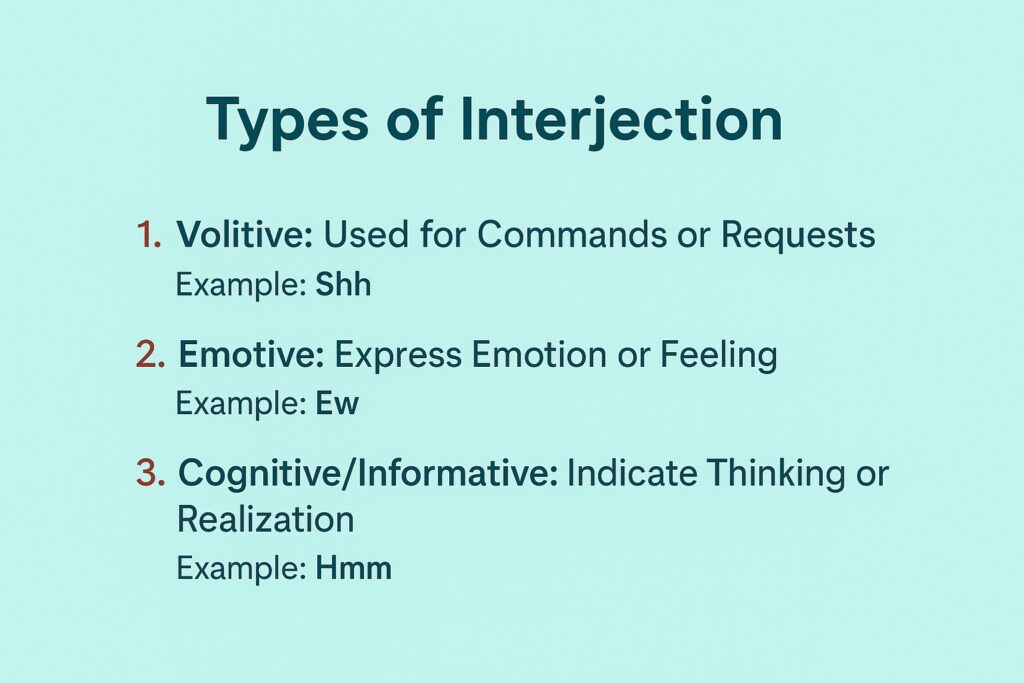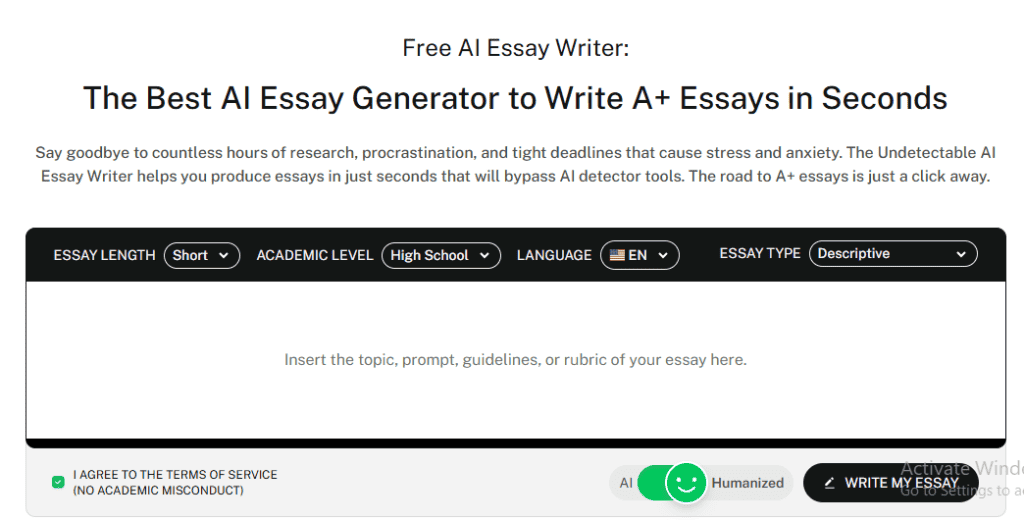Do you ever say something totally normal, like “Thanks” or “I see,” and someone replies with, “Whoa, no need to snap”?
That right there probably wasn’t your words talking. It was your delivery. In language, emotion sneaks in through all kinds of back doors. One of those is interjections.
From a verb POV, to interject means to interrupt and throw something in between or among other things.
That’s pretty much what interjections do: they interrupt a sentence.
Now, don’t mistake this interruption for an interruption of a conversation. Good interjections don’t interrupt a conversation.
Then what sort of interruption are we talking about? And what are interjections in practice? You’ll learn everything about interjections in this detailed blog.
Key Takeaways
- Interjections are words or phrases used to express emotion or reaction, like “wow,” “oops,” or “meh.”
- Unlike other parts of speech, interjections don’t play a grammatical role in the sentence.
- You can use interjections alone or insert them into sentences using commas or parentheses.
- Interjections can be categorized by their intent: volitive, emotive, or cognitive.
- Interjections function very differently from other parts of speech.
Let’s start.
Definition of an Interjection
An interjection is a short word or phrase that gets thrown into a sentence, sometimes all by itself, to show some sort of emotion.
Surprise, excitement, frustration, confusion, etc. If you can feel it and blurt it out, there’s probably an interjection for it.
All the major dictionaries agree, more or less, on the interjection definition that it’s a quick, often sudden expression of emotion, usually squeezed into conversation without much warning.


Never Worry About AI Detecting Your Texts Again. Undetectable AI Can Help You:
- Make your AI assisted writing appear human-like.
- Bypass all major AI detection tools with just one click.
- Use AI safely and confidently in school and work.
For example, here’s the interjection definition from Merriam-Webster:

What Is an Interjection in Grammar?
Grammatically speaking, an interjection doesn’t play by the usual rules.
It doesn’t plug neatly into the sentence like a noun or a verb. It just shows up, uninvited but definitely noticed.
Its function in a sentence is to add feeling. That is to say, a sentence can still be complete without an interjection.
So, in terms of structure, an interjection stands on its own.
And if it’s aptly in a sentence, you’ll get the mood of the speaker instantly, without needing much context.
Let’s say someone drops a heavy box right next to you.
You’re probably not going to say, “I am alarmed by that sound.”
You’re more likely to just shout, “Whoa!” or maybe something a little less printable 😉.
That’s an interjection in action. The interjection meaning revolves around this very concept: reaction over reflection.
How It Functions Independently in Sentences
What’s interesting is that while interjections often appear as standalone expressions, they can also sneak into the middle of sentences.
When they do, they have to be marked off properly, usually with commas, parentheses, or dashes, because they don’t exactly belong there grammatically.
For example: “I was going to explain everything, but, ugh, I forgot what I was saying.”
The “ugh” isn’t grammatically tied to the rest of the sentence, but it’s still communicating something real.
Not Grammatically Connected to Other Words
That brings us to another point: interjections are independent little units.
They’re not grammatically connected to other words in the sentence.
So even when they’re placed alongside a full sentence, they’re floating.
And because they’re not essential to the sentence grammatically, you can remove them without changing the core meaning, though you’ll definitely lose a layer of emotional nuance.
Now interjections can so neatly camouflage themselves in sentences that you might not even realize that you just heard or read an interjection.
So for that matter, you can use our Ask AI chatbot to help you identify interjections in sentences or distinguish them from verbs and adverbs.
Common Examples of Interjections
All interjections serve the same purpose of delivering emotion fast and in real-time.
Below is a collection of interjection examples that show the range of what these words and phrases can do:
| Interjection Example | Usage (Meaning) | Sentence |
| Wow | Admiration or amazement | Wow, you actually finished that 1,000 piece puzzle? |
| Ouch | Sudden pain | Ouch! That drawer just attacked my fingers. |
| Ugh | Disgust or frustration | Ugh, I can’t believe we have to start over again. |
| Yikes | Fear or alarm | Yikes! That was way closer than it should’ve been. |
| Hooray | Excitement or celebration | Hooray! We made it before the deadline. |
| Oh no | Dismay or disappointment | Oh no, I forgot to send the email again. |
| Ahem | Drawing attention, sometimes sarcastically | Ahem, you’re sitting in my spot (says Sheldon Cooper 😆). |
| Whew | Relief or exhaustion | Whew, that exam was brutal. |
| Eww | Disgust | Eww, what is that smell? |
| Duh | Obviousness or sarcasm | Duh, of course you need an umbrella, it’s raining. |
| Yippee | Pure joy | Yippee! The concert got rescheduled to Friday! |
| Whoa | Surprise or awe | Whoa, that dog can skateboard? |
| Hey | Attention-grabbing | Hey, your bag is still on the bus! |
| Uh-oh | Trouble is coming | Uh-oh, I think I clicked the wrong link. |
| Boo-yah | Victory or triumph | Boo-yah! That’s how you close a deal. |
| Ha | Laughter or mockery | Ha! Told you the vending machine still works. |
| Gosh | Surprise, frustration, or annoyance | Gosh, this line is never-ending. |
| Meh | Indifference | Meh, the movie was fine, I guess. |
| Oops | Small mistake or clumsiness | Oops, didn’t mean to send that to the whole team. |
| Bravo | Approval or praise | Bravo! That was an impressive presentation. |
Notice how flexible and wide-ranging interjections can be?
They don’t belong to one emotional category, and they’re definitely not limited to a particular grammar rulebook.
Now here’s another thing about interjections: there isn’t a sacred list of only acceptable interjections.
Pretty much any word or phrase can become one, as long as it’s being used to convey a reaction or emotion in the moment.
Let’s look at a few examples. Say someone tells you they’ve adopted a senior dog.
Instead of responding with a textbook interjection like “Aww,” you could say:
- Legendary! You adopted a senior dog? That’s amazing.
Or maybe:
- What a move. You adopted a senior dog? Total heart-winner.
Even something as ordinary as a food name could work in the right context:
- Spaghetti! I didn’t expect you to say that.
Or this one:
- Finally, some peace. The neighbors stopped drilling holes at midnight.
It all depends on how it’s delivered.
As long as the word or phrase expresses something emotionally, it can act as an interjection, even if it wasn’t born as one.
Adjectives, nouns, and full-on mini sentences, they’re all fair game. For example:
- Spectacular! You fixed the bug before the meeting.
- Not again! The printer’s jammed for the third time today.
- She’s unbelievable. That intern just pitched a better plan than the senior manager.
Types of Interjections
Now that we’ve seen what is an interjection in examples, let’s look at its categories.
Depending on why someone blurts something out, the interjection can fall into one of several types.

Volitive: Used for Commands or Requests
Volitive interjections pop up when someone wants you to do something or stop doing something.
These interjections might not come across like full-on orders, but they carry the same weight.
You’ll find them to be short and usually contain a built-in sense of urgency.
| Interjection Example | Usage (Meaning) | Sentence |
| Shh | Asking for silence | Shh! I’m trying to listen to the announcement. |
| Psst | Calling someone’s attention quietly | Psst. You dropped your phone. |
| Ahem | Gently prompting attention | Ahem. We haven’t voted yet. |
| Hey | Getting attention or calling out | Hey! Don’t walk away while I’m talking. |
| Yo | Informal way to get someone’s attention | Yo, over here! |
| Stop | Demanding a halt to something | Stop! That’s not how you hold the knife. |
Emotive: Express Emotion or Feeling
Emotive interjections are the ones that convey feelings of joy, disgust, anger, surprise, etc.
If it’s emotional, there’s an interjection for it.
Some emotive interjections are friendly. Some are not. And yes, some live in that colorful category known as curse words (which we won’t spell out here, but you know the ones).
| Interjection Example | Usage (Meaning) | Sentence |
| Ew | Disgust | Ew, that milk has gone completely sour. |
| Yay | Excitement or happiness | Yay! I got the last ticket to the concert. |
| Ugh | Frustration | Ugh, I knew I should’ve brought an umbrella. |
| Oof | Sympathy or a minor pain | Oof, that response was harsh. |
| Yum | Delight in taste | Yum! This pasta is on another level. |
| Aww | Tenderness or sympathy | Aww, that puppy is smaller than my slipper. |
| Whoa | Shock or awe | Whoa! Did you see that lightning strike? |
Cognitive/Informative: Indicate Thinking or Realization
Cognitive interjections sound like the inner monologue spilling out loud.
They’re the ones that show hesitation, realization, or any kind of lightbulb moment.
You’ll often hear them when someone’s trying to buy time while thinking or suddenly having a breakthrough.
Here are a few interjection examples of the cognitive type:
| Interjection Example | Usage (Meaning) | Sentence |
| Um | Hesitation or confusion | Um, could you repeat that part about the refund? |
| Huh | Lack of understanding or confusion | Huh, I didn’t expect that result. |
| Oh | Realization or surprise | Oh! That’s why the shortcut didn’t work. |
| Hmm | Deep thought or doubt | Hmm, I’m not convinced that’s the right approach. |
| Eureka | Sudden discovery or insight | Eureka! I finally cracked the login issue. |
| Aha | Realization or a clever insight | Aha! So that’s where the missing piece goes. |
One underrated fact about interjections is that they make writing sound human, as you saw in all the examples so far.
If you are having a hard time making a writing piece sound less robotic, consider inserting some relevant interjections. But if there is too much text, doing this manually can get frustrating.
So why not use our AI Humanizer?
Simply give it your text, and it’ll rewrite robotic, overly formal phrases or complex sentences into more natural, expressive sentences using interjections.
How to Use Interjections in Sentences

We simply showed you some sentences with interjections in them. But there are some rules for using interjections that you probably couldn’t notice.
Fortunately, the rules here aren’t too complicated. Interjections are informal by nature, and that flexibility extends to how you punctuate and place them.
Generally speaking, interjections show up in two ways: either as standalone expressions or as elements inserted into a sentence.
Let’s look at some interjection examples in both forms to see how this works in practice.
Interjections Used by Themselves
In this type of usage, the interjection stands alone, typically right before or after a complete sentence.
It’s not attached grammatically, but still communicates something that the main sentence doesn’t, usually the speaker’s reaction or emotional state.
Also worth noting: if the emotion leans toward confusion or questioning, the interjection might end with a question mark rather than an exclamation point.
| Interjection Example | Usage (Meaning) | Sentence |
| Wow | Surprise or amazement | Wow! That sunset looks unreal. |
| Uh-oh | Realization of a problem | Uh-oh! I think I left the oven on. |
| Amazing | Enthusiastic praise | Did you see that move? Amazing! |
| Seriously | Disbelief or doubt | You paid how much for that? Seriously? |
| Today | Urgency or emphasis | When’s the deadline? Today! Get to it! |
| Huh | Confusion or mishearing | She’s quitting? Huh? Didn’t see that coming. |
Interjections Within Sentences
When used mid-sentence, interjections still don’t take on any grammatical role.
That’s why they’re separated visually with punctuation. It’s also why you shouldn’t just drop them in raw without any commas or markers; otherwise, the sentence can get confusing.
| Interjection Example | Usage (Meaning) | Sentence |
| Whoops | Minor mistake | Whoops, I left my badge at home again. |
| Yikes | Alarm or fear | Yikes, that’s a lot of bees in one place. |
| Boy | Exaggerated expression | I just finished the hike and, boy, am I exhausted. |
| Huh | Confirmation or disbelief | I guess that’s it, huh? |
| Ugh | Frustration | We have to clean the garage again, ugh, this weekend. |
| Ahem | Drawing attention politely | I was saying, ahem, that you missed the meeting. |
It doesn’t matter if the interjection is standing alone or tucked into a sentence. The main thing is clarity.
Does the punctuation make the meaning obvious? Does the emotion come through without interrupting the flow of thought?
If you’re ever unsure, it’s worth giving your writing a quick check.
That’s where a tool like Grammar Checker by Undetectable AI can be helpful.
It can scan for misplaced commas, missing punctuation, and awkward phrasing, especially when you’re working with informal elements like interjections.
Interjections vs Other Parts of Speech
Now let’s look at how interjections stack up against other parts of speech.
While most words in a sentence are there to do something grammatically, like naming, describing, or connecting, interjections are on their own wavelength.
They’re not here to form structure. They’re here to add emotion.
Here’s a quick comparison between interjections and other relevant parts of speech:
| Part of Speech | Purpose | How It Compares to Interjections | Example Sentence |
| Interjection | Express emotion or spontaneous reaction | Stands alone; not grammatically tied to sentence structure | Yikes! That meeting went downhill fast. |
| Conjunction | Connect words, phrases, or clauses | Always used within a sentence to link ideas | She likes coffee and bagels. |
| Adverb | Modify verbs, adjectives, or other adverbs | Provides detail about how, when, or where; unlike interjections, adverbs serve a grammatical function | He spoke loudly during the call. |
| Adjective | Describe or modify nouns | Tied to sentence structure; interjections never modify other words | That was a terrible idea. |
| Noun | Name a person, place, thing, or idea | Functions as subject or object in a sentence. Interjections do neither | Oops! I forgot the keys at home. |
| Verb | Describe an action or state | Carries the main action or being in a sentence | I ran out of time, again. |
If you’re writing something creative, especially dialogue or expressive writing, and want your tone to feel more natural, playful, or intense, interjections can help.
But do you have what it takes to weave them in without overdoing it or breaking the rhythm?

To enhance your writing’s emotional tone without sounding forced, try using the AI Essay Rewriter by Undetectable AI.
It can help you naturally blend interjections into your writing and fine-tune the overall tone.
Test our AI Detector and Humanizer now using the widget below!
FAQs About Interjections
Can a single word be a sentence?
Yes, a single word can absolutely be an interjection. Words like “wow,” “ouch,” and “ugh” are common one-word interjections that express emotion or reaction.
Do interjections always end in exclamation points?
No, interjections do not always end in exclamation points.
They can also end in commas, periods, or question marks, depending on the emotion or tone being conveyed.
Are interjections used in academic writing?
Interjections are generally not used in formal or academic writing.
They are considered informal and are more appropriate in casual communication or creative writing.
Is “like” an interjection?
“Like” is not usually an interjection. It is most commonly used as a preposition, conjunction, or filler word.
However, in very rare cases, it could act like an interjection in informal speech when expressing surprise or disbelief, such as in “Like, seriously?”
Final Thoughts
Interjections may be short, but they help us speak the way we feel without needing a paragraph to explain ourselves.
Once you know how they work and where they fit, you’ll start spotting them everywhere: in conversation, in writing, even in the occasional side-eye-worthy group chat.
Now that you’ve got a full understanding of interjection examples, meanings, and uses, you can slip them into your writing naturally.
Need help adding emotion and natural flow to your creative writing?
Try the Undetectable AI tools.
They can help fine-tune your tone, weave in interjections more smoothly, and make your writing sound less like a robot and more like, well, you.
